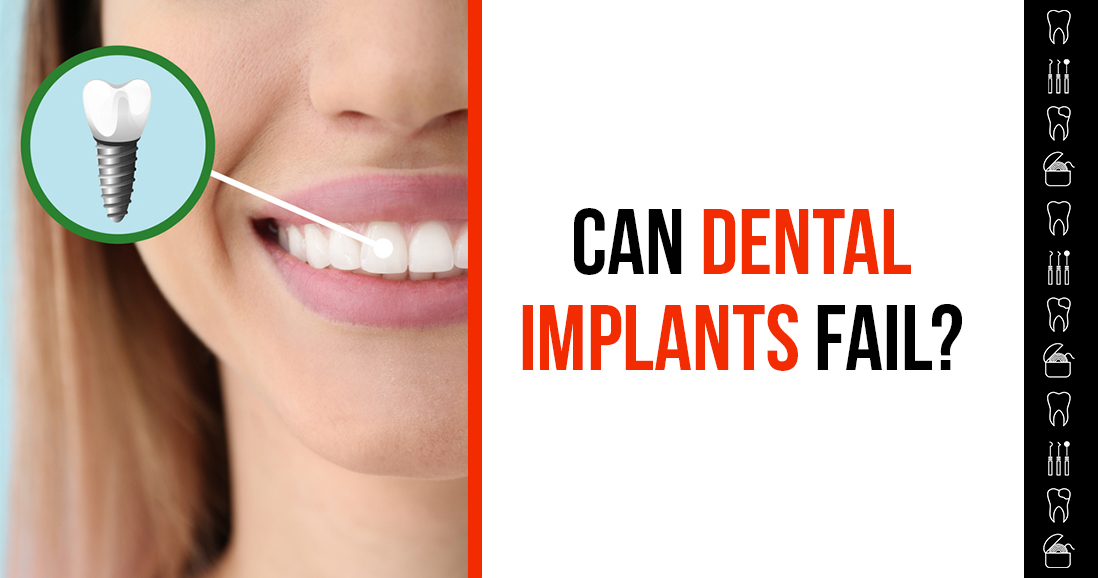CAN DENTAL IMPLANTS FAIL?
Many studies have shown that 90 to 95% of the time, dental implants are a successful treatment for missing teeth. A dental implant is a tooth-replacement structure inserted into or onto your jawbone, which acts as an artificial tooth root. A prosthetic tooth called a Crown is attached to the implant to complete the treatment for the missing tooth. Implants are generally considered permanent fixtures inserted in the jaw.
A dental implant, in general, is intended to be a permanent fixture in your mouth. In fact, studies have shown that dental implants have a 90 to 95 percent success rate over a ten-year period.
This article talks about how long does a dental implant last, what are the types of dental implants, the factors influencing the failure of implants, and treatment for implant failure.
How long do teeth implants last?
Dental implants are designed to be long-lasting. This is because they immediately connect with the jawbone, becoming linked with surrounding bone tissue through a process known as osseointegration.
When the process of osseointegration is completed, the implant has bonded with the surrounding bone. As a result, the implant starts to function as an artificial tooth root, establishing a firm foundation for a prosthetic tooth. While the implant is intended to be permanent, the crown affixed to it may need replacement due to regular wear and tear.
Types of Dental Implants
Dental implants are among the permanent teeth replacement treatments. Dental implants are classified into two categories.
Endosteal implants
Endosteal implants resemble little screws and are the most prevalent type of dental implant. These are commonly made of titanium; however, they are also created from ceramic. These implants usually are put straight into your jawbone.
Subperiosteal implants
Subperiosteal implants are surgically implanted beneath the gums and on top of the jawbone. They are made from a metal structure with little extensions that stick out slightly from the gums. These teeth implants are usually prescribed when:
- A patient does not have a healthy jawbone to support an endosteal implant
- A patient cannot or does not want to have an extra operation, such as a bone graft, performed before implant placement
Factors affecting Dental Implant Failure
Although dental implants can last a lifetime for many people, they can fail in some scenarios. Implant failure generally occurs when something conflicts with osseointegration or the healing process.
Factors that may contribute to implant failure include:
Inadequate Oral Care
Oral hygiene for implants is equally vital as it is for natural teeth. The peri-implant disease occurs when plaque buildup affects the region around the single tooth implant. Plaque buildup can cause gum disease, harming gums and jawbone. Peri-implant disease is reversible in its early stages. If left untreated, it can proceed to a condition known as peri-implantitis, which can result in implant failure.
As a result, it is critical to maintaining appropriate oral hygiene, which includes the following:
-
- Cleaning your teeth at least twice a day
- Flossing daily and minimizing your intake of sugary foods
- Checking up with your dentist every six months
Bone Deficiency
Endosteal implants must be installed onto the patient’s jawbone. As a result, a tooth implant can fail due to an insufficient jawbone. A thorough assessment of the jawbone is completed before implant insertion; keep it securely in place.
If there is inadequate bone, a patient can choose a treatment like bone grafting or sinus lifting before having an endosteal implant. The bone loss might also destabilize an implant over time. Bone deficiency can happen due to factors such as:
- peri-implant infection
- osteoporosis
- other medical diseases affecting bone health
Smoking
Cigarette smoking is another risk for gum disease. Research has shown that people who smoke have a lower success rate with dental implants. Smoking may result in implant failure because it might disrupt blood flow to the afflicted area, affecting osteointegration and the healing process.
Teeth Grafting
Teeth Grafting or experiencing occlusal trauma can result in dental implant fracture, screw loosening or fracture, or porcelain fracture on the dental crown. It is because repetitive grinding motions or concussions can induce microscopic movements of the implant, disrupting the osseointegration process.
Age
Dental implants may fail more frequently in older people due to the possibility of other underlying medical or bone issues. Healing may also be slower in the elderly.
What happens when dental implants fail?
If a patient experiences any symptoms that lead to a failed implant, they should immediately see a dentist or periodontist. Some potential signs of implant failure include:
- Movement of an implant
- Discomfort or pain while chewing or biting
- redness
- swelling
- bleeding
- pus
- receding gums
Treatment for failed dental implants
According to studies, replacing single dental implants in the same site has a 71% success rate; however, an implant can be replaced in case of failure. Local anesthetic is used to remove a failed implant. If the bone loss occurs around the implant, a bone graft may be required to grow bone tissue before a new implant is installed.
Dental bridges and dentures are great alternative treatments if a patient chooses not to go through the complete replacement of a faulty implant.
Take Away
Dental implants are intended to be long-term solutions because implants interact with your jawbone and become joined with the surrounding bone through osseointegration. Dental implants can fail in various instances, which can be attributed to several things.Ideal Dental Care is a perfect place to get safe implant treatment with professional experts and advanced technology. A failing implant can occasionally be replaced; however, other treatment options are available if necessary. If patients notice implant failure indicators, they can consult our team for the best dental treatments in Indore.



